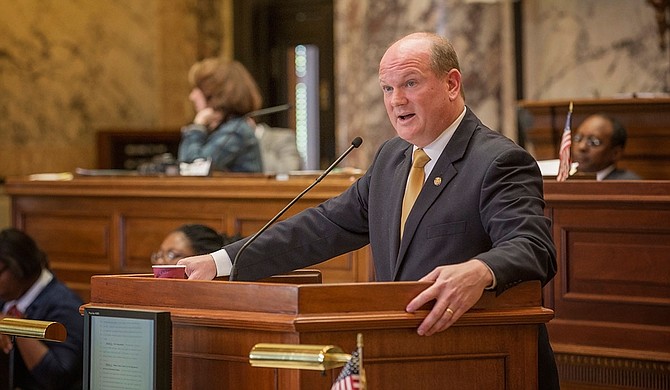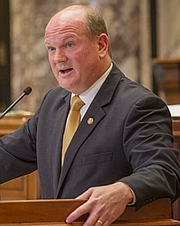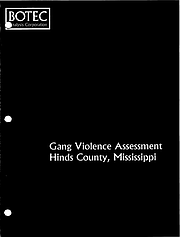Sen. Brice Wiggins' newest iteration of the Mississippi Gang Law has prevailed in committee over objections that it threatens constitutional rights and could lead to over-incarceration. File Photo by Imani Khayyam
An expansion of the Mississippi's Street Gang Act could turn it into a state version of a RICO law—federal legislation adopted in 1970 to target La Cosa Nostra, more commonly known as the mob. This session marks the third time in four years that a former Gulf Coast prosecutor has tried to strengthen the gang law, saying it would make it easier to get violent gang members off the streets.
In an interview in his Capitol office on Feb. 24, the Jackson Free Press asked Sen. Brice Wiggins, R-Pascagoula, if his push for Senate Bill 2459 is a way for Mississippi to have its own little Racketeer Influenced and Corrupt Organizations Act. He looked surprised at the question, but answered yes while nodding.
"It's similar to RICO—the mob is running, whatever, the convenience store out there in furtherance of the mob," Wiggins said while sitting under an awards plaque from the Mississippi Association of Gang Investigators, which lobbies hard for an expanded law to make it easier to arrest those identifying with or recruiting street-gang members in Mississippi.
MAGI's slogan is "Never Back Down," and its logo is blood dripping off two crossed AR-15 rifles with a skull in the center.
'Conspiracy to Exercise Constitutional Rights'
Key to federal RICO law is showing a criminal "enterprise" and its conspiracy to commit actual and repeated "predicate" crimes—not simply identifying with a particular group or having a certain tattoo. Even then-U.S. Attorney General Janet Reno's expansion of the federal RICO Act to use against street-gang conspiracies focused on specific types of criminal enterprises and particular predicate crimes beyond membership, but Wiggins' updates to the existing Street Gang Act spends a lot of space making it easier to define someone as a gang member in Mississippi. That characterization can mean enhanced fines and much longer prison sentences that the actual crimes committed would under state law. And as under federal RICO law when used against street gangs, that can mean race-based disparities in application of the law.
When asked in his office, Wiggins was quick to point out that gang membership or identification itself would not be a crime under the expanded act, but then acknowledged that gang recruitment alone was sufficient cause for a warrant, arrest and conviction under his expanded language. That is, his act would allow arrest and prosecution of people meeting the expanded definition of being in a gang if they "cause, encourage, solicit, recruit or coerce another to become a member or associate of a gang," although gang membership or identification alone is supposedly legal.
Only Black People Prosecuted Under Mississippi Gang Law Since 2010
Mississippi legislators like Republican Sen. Brice Wiggins point to growing white gangs to push for tougher gang laws. But there's a problem.
The expanded act, therefore, would criminalize recruiting someone into an organization in which membership is not illegal or an existing crime.
In contrast, the federal RICO law does not target recruitment into a legal organization alone as a criminal act; it focuses on actual criminal conspiracy.
"If that's how they're going to use this, that's the broadest possible interpretation. That's very, very troubling," Office of Capital Defense Counsel Director Andre de Gruy told the Jackson Free Press. "It's conspiracy to exercise constitutional rights."
The way RICO laws are supposed to work is targeting conspiracy to commit existing crimes, legal avenues that already exist. But Wiggins wants to expand the1997 Street Gang Act—which the Jackson Free Press reported in 2018 had only targeted African Americans from 2010 to 2017 despite heavy white gang presence in the state—to center around his newly defined charge of "criminal gang activity." Thus, the law could send more people identifying with gangs into state prisons where gang activity is blamed, accurately or not, for a spate of uprisings and deaths.
Wiggins uses the gang activity inside prisons to push for his expanded gang law.
"It's necessary because there's gangs throughout the state of Mississippi. Currently what you see is what's going on in MDOC," Wiggins told the Jackson Free Press, referring to the Mississippi Department of Corrections where many prisoners join gangs, including for protection against other ones. But Wiggins is not afraid that the bill's broad language could lead to abuse.
"There's multiple things that have to occur before it can reach probable cause," Wiggins cautioned, although those items are not clear in the proposed gang-law expansion. Recruitment into a group that is not illegal to be a part of would help create that probable cause under this legislation.
Wiggins was skeptical when the Jackson Free Press mentioned experts' warnings that many young people identify with "gangs" out of a need for belonging or group identification and that are not necessarily involved in any kind of criminal conspiracies. When told that a former Simon City Royals gang leader who now works to reduce violence in Jackson had not been part of a criminal enterprise—individual members had sold drugs or gotten info fights—Wiggins wasn't buying it.
The Rise of America's White Gangs
Donna Ladd reports for The Guardian on the largely ignored rise of white gangs in America, and how they're treated differently from black and Latino gangs. Photo: Imani Khayyam
"That's what they all say," Wiggins responded to the fact that someone can identify with a gang without being part of what the federal RICO Act would consider a criminal conspiracy.
"That language creates serious First Amendment concerns," Joshua Tom, interim director and legal director of ACLU Mississippi, said of Wiggins' new language. "Getting someone to participate in a group to explicitly do something illegal is one thing." But, he added, "gangs can serve as peer groups. (Criminalizing that) is possibly making it illegal to engage in legal behavior."
During the interview, Wiggins also repeated his long-time accusation that those opposed to his expanded gang law do not believe gangs exist. Experts such as Ron Noblet, who works to decrease gang violence in Los Angeles and co-wrote the Legislature-funded BOTEC Analysis reports on gangs in Jackson in 2016—warn that over-criminalizing supposed gang members, regardless of actual criminal activity, can lead to worse behavior later or membership in a hardened gang in prison, meaning he and she can leave prison more violent.
So, You Want Money, Right?
Jimmy Anthony, vice president of the nonprofit Mississippi Association of Gang Investigators, has been a regular presence at the Legislature in recent years to push for adoption of an expanded RICO-type gang bill. At the Feb. 25 Judiciary B meeting chaired by Wiggins, Anthony again warned legislators that gangs exist in all 82 counties of Mississippi—a fact that is not really in dispute and, as even Wiggins told the Jackson Free Press, does not alone indicate criminal behavior as it is not illegal to identify with a gang.
Senate Minority Leader Derrick Simmons, D-Greenville, asked Anthony for detailed information on the various counties and their gangs. In response, Anthony pushed for a stronger gang law.
"A lot of the counties, there's no funding for gang investigations in this state. None. So every investigator is having to do this on top of their regular caseload, because you can't hire someone to focus just on gangs. Sheriffs are frustrated—the law is so weak," Anthony said.
"So you want money, right?" Simmons asked.
"No. No, we don't want money. We want to be able to get this law in place," Anthony replied, saying law enforcement needs help fighting gangs. "The federal government can do their RICO Acts—we're trying to maintain and stop the violence here, that's the point of the law, where we can do something about the violence and the intimidation and the abusing of our children here in the state," he said.
That circular logic is similar to Wiggins' arguments to expand the gang law in past years. In 2017, Wiggins pointed to murders in the state by men supposedly in gangs in which the prosecutors themselves said the gang membership was unrelated to the violence for which they were prosecuted. Still, Wiggins argued that the men's potential gang affiliation was a reason to pass his expanded gang act, even as researchers have shown the federal RICO Act to have racist application when used against street gangs.
Early in the committee's discussion of the bill, Simmons successfully proposed an amendment reducing the penalties for the new charge of criminal gang activity, lowering the sentencing from five to 20 years to three to 15. Later, Simmons attempted to constrict the scope of the bill, offering an amendment to constrain it to activities within Mississippi's prison system, where Simmons said gang violence—and recruitment—is at its worst.
Wiggins pushed back. "I think that amendment would defeat the purpose of the bill," he said. The amendment failed on a 5-7 vote. No fiscal note accompanied the gang bill, which would have explored the financial cost of creating new criminal charges. The gang bill passed out of the committee on a voice vote.
Never Back Down: Mississippi Escalates War on Gangs
A proposed gang bill was not based on current evidence-based violence research. It died in the Legislature.
The state's spike in incarceration worries Simmons, especially in concert with making it easier to send someone to jail for identifying with a gang. "Mississippi as a state has passed Oklahoma in incarceration rates, from third to second. We're headed back to first, regarding incarceration rates. We should be trying to move to 50th," he told the Jackson Free Press in an interview.
Simmons also shared the ACLU's constitutionality concerns about Wiggins' gang bill, saying a fixation on gang membership itself is not necessary to prosecute crimes.
"I do not agree with the aims and the purposes of the KKK," Simmons said. "But if the KKK or the members of the KKK commit a murder, there are laws on the books to address the crime that they committed. I do not think constitutionally that the KKK or any group should be criminalized based on their association."
Even the determination of what constitutes a gang, and that Wiggins and Anthony believe justifies the steep criminal penalties associated with involvement or recruitment, remains murky to legislators and outside observers alike.
"It is a very subjective standard that the bill puts into statute," Simmons said.
Email state reporter Nick Judin at [email protected] and follow him on Twitter at @nickjudin. State intern Julian Mills contributed to this report.







Comments
Use the comment form below to begin a discussion about this content.
comments powered by Disqus